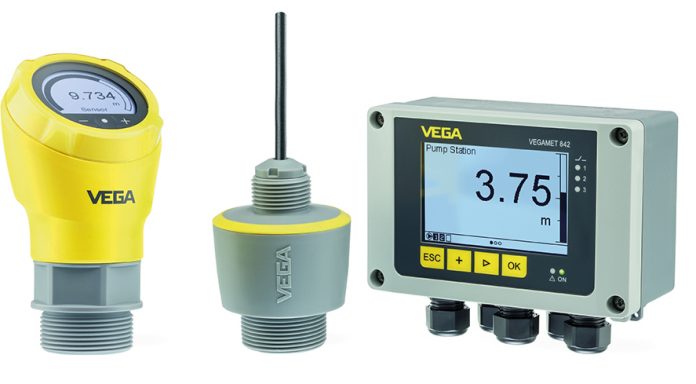Extended family for water and wastewater industries
VEGA has extended its proven VEGAPULS family for continuous level measurement. The new radar instrument series is based on the latest FMCW 80-GHz technology and, thanks to a specially developed radar level microchip and low price, it represents a real alternative to ultrasonic technology. It makes it highly economical for those applications found in the water/wastewater sector, or auxiliary applications in process automation. The compact loop powered radar is available in two versions: as compact model with a cable connection housing and as standard model with fixed cable connection (IP68) .
Strong focusing ensures measurement without the jumps
With 80-GHz technology, the radar beam is much more focussed and can be aimed at the measured medium with pinpoint accuracy. As a result, narrow shafts or deposits on vessel walls or internals such as pipes or pumps cannot create false signals and jumping outputs. So in contrast to ultrasonic technology, radars very rarely require false signal suppression in busy wet well shafts.
No dead zones for measurement in confined spaces
One special advantage of these new sensors is they have no dead/blanking zone, thus enabling them to measure right up to the top of the vessel. Typical areas of application are areas where space is limited with measurement or head-space, like underground assets; like CSO’s and sewers, in culverts, underside of bridges, pipes, as well as small tanks or hoppers when capacity is at a premium .
Handles Build Up
Sensors constantly struggle with the problem of build up, maintenance call outs to ultrasonic devices ‘needing a wipe’ are widely reported in the sector. This is because contamination or condensation on the ultrasonic sensor face can greatly affect the reliability of the measurement signal and enlarge the dead zone. Using radar technology, the situation is different, a combination of the measuring principle and optimized signal processing enables these radar sensors to ignore interference caused by build up on their antenna system, which means they are immune to the effects of condensation and highly resistant to dirt and normal build up levels, reducing nuisance outages and cleaning.
Chemicals and EX approval
Storage and buffer tanks supply the chemicals for waste water treatment processes. The new radar sensors can exploit their strengths here, as they can be installed in very confined spaces and small process fittings. Or they can look through plastic tanks and safely measure the chemicals inside. Even if the medium generates gases, the sensors remain unaffected and deliver reliable measuring results. In addition, they have an Ex approval for flammable media. So it makes them highly versatile for use in a wide range of applications.
Reliable level values independent of process and environmental influences
Due to their physical measuring principle, ultrasonic sensors are easily affected by ambient conditions: for example, the transit time of sound changes with temperature, like warming by the sun or varying vapour and gas composition, these can all affect measurement accuracy. Strong winds, rain, or even fog, can damp the emitted sound waves and restrict their measuring range. Radar sensors, however, are not affected by these conditions – or even pressure, vapours, gases or vacuums – they continue with accurate readings.
Open channel flow measurement needs the highest possible accuracy and stability due to the root calculation of the flow formula. In outdoor applications, whether in rain or intense sunlight, the new radar sensors perform accurately without any temperature effects. One example is flow rate measurement in the main inlets of the sewage treatment plant. The focused, high performance of the new radar sensors, enables precise measurement and therefore a reliable calculation of wastewater flows.
Low power for remote sites and telemetry
Because of these immunities, the new compact radar sensor is ideal for monitoring of river and flood levels. Its measured values are crucial for being able to react quickly and correctly in the event of flooding. Radar sensors can monitor river levels without being affected by temperature stratification/fluctuations, high winds, rain or heavy mist. Even at a distance of 30 meters from the water surface, a radar transmitter delivers level readings with millimetre resolution. They also offer SDI12 and Modbus outputs, and all devices have a sub 10 second start up cycle, making them highly suitable for use with battery powered telemetry outstations and loggers.
Bulk solids level monitoring too
Another example, is lime silo level measurement, which is used to stabilize the effluent pH value, this is an ideal application for the new instrument series. Bulk solids can be measured reliably with no effect from dust generated during the filling process. Thanks to strong signal focusing, build up and deposits on the container wall or on the sensor face itself are no problem.
Optional controllers and Bluetooth built in
The radars also have an optional controller for local display, extra outputs and level alarms. Both sensors and controllers can be easily and safely adjusted via Bluetooth with a smartphone or tablet – ideal for harsh environments, operational safety or Ex areas.
www.vega.com/uk



